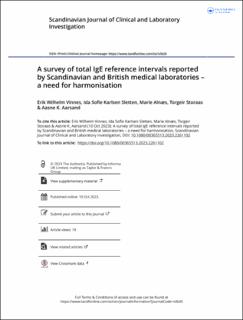A survey of total IgE reference intervals reported by Scandinavian and British medical laboratories – a need for harmonisation
Vinnes, Erik Wilhelm; Sletten, Ida Sofie Karlsen; Alnæs, Marie Bjørbak; Storaas, Torgeir; Aarsand, Aasne Karine
Journal article, Peer reviewed
Published version

Åpne
Permanent lenke
https://hdl.handle.net/11250/3109027Utgivelsesdato
2023Metadata
Vis full innførselSamlinger
- Department of Clinical Science [2317]
- Registrations from Cristin [9766]
Originalversjon
Scandinavian Journal of Clinical and Laboratory Investigation. 2023, 83 (7), 470-478. https://doi.org/10.1080/00365513.2023.2261102Sammendrag
Objectives
There appears to be marked discrepancies between total IgE reference intervals (RIs) in use by many laboratories and those recommended by published studies. The aim of this study was therefore to review total IgE RIs currently reported by Scandinavian and British laboratories and to compare these to published RIs identified by a literature review.
Methods
Relevant laboratories were identified by test directories provided by the national accreditation bodies in Norway, Sweden, Denmark and the UK. Total IgE RIs and their sources were acquired by accessing laboratory user handbooks or by an electronic survey. In addition a literature review of published total IgE RI studies was performed.
Results
From 172 accredited laboratories providing total IgE analysis, data was acquired from 122 laboratories. An adult upper reference limit between 81 to 150 kU/L was reported by 89% of these. Denmark and Sweden reported the most harmonised RIs whilst Norway and the UK exhibited the least degree of harmonisation. Published adult (n = 6) and paediatric (n = 6) RI studies reported markedly higher upper limits than those currently in use by the laboratories included in this study. There were also large variations in the number of age strata in use for paediatric RIs.
Conclusion
This study demonstrates large variations in currently utilised IgE RIs by Scandinavian and British accredited laboratories and most report markedly lower RIs than those recommended by recent RI publications. Many laboratories likely utilise outdated RIs and should consider critically reviewing and updating their RIs.
